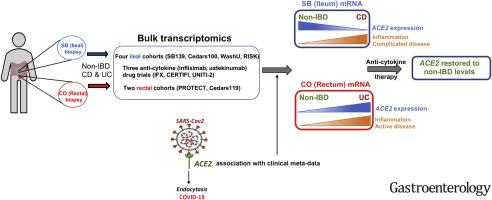Gastroenterology ( IF 25.7 ) Pub Date : 2020-11-05 , DOI: 10.1053/j.gastro.2020.10.041 Alka A Potdar 1 , Shishir Dube 1 , Takeo Naito 1 , Katherine Li 2 , Gregory Botwin 1 , Talin Haritunians 1 , Dalin Li 1 , David Casero 1 , Shaohong Yang 1 , Janine Bilsborough 1 , Jacqueline G Perrigoue 2 , Lee A Denson 3 , Mark Daly 4 , Stephan R Targan 1 , Phillip Fleshner 1 , Jonathan Braun 1 , Subra Kugathasan 5 , Thaddeus S Stappenbeck 6 , Dermot P B McGovern 1

|
Background And Aims
The host receptor for severe acute respiratory syndrome coronavirus 2, angiotensin-converting enzyme 2 (ACE2), is highly expressed in small bowel (SB). Our aim was to identify factors influencing intestinal ACE2 expression in Crohn’s disease (CD), ulcerative colitis (UC), and non–inflammatory bowel disease (IBD) controls.
Methods
Using bulk RNA sequencing or microarray transcriptomics from tissue samples (4 SB and 2 colonic cohorts; n = 495; n = 387 UC; n = 94 non-IBD), we analyzed the relationship between ACE2 with demographics and disease activity and prognosis. We examined the outcome of anti–tumor necrosis factor and anti–interleukin-12/interleukin-23 treatment on SB and colonic ACE2 expression in 3 clinical trials. Univariate and multivariate regression models were fitted.
Results
ACE2 levels were consistently reduced in SB CD and elevated in colonic UC compared with non-IBD controls. Elevated SB ACE2 was also associated with demographic features (age and elevated body mass index) associated with poor coronavirus disease 2019 outcomes. Within CD, SB ACE2 was reduced in patients subsequently developing complicated disease. Within UC, colonic ACE2 was elevated in active disease and in patients subsequently requiring anti–tumor necrosis factor rescue therapy. SB and colonic ACE2 expression in active CD and UC were restored by anti-cytokine therapy, most notably in responders.
Conclusions
Reduced SB but elevated colonic ACE2 levels in IBD are associated with inflammation and severe disease, but normalized after anti-cytokine therapy, suggesting compartmentalization of ACE2-related biology in SB and colonic inflammation. The restoration of ACE2 expression with anti-cytokine therapy might be important in the context of severe acute respiratory syndrome coronavirus 2 infection and potentially explain reports of reduced morbidity from coronavirus disease 2019 in IBD patients treated with anti-cytokines.
中文翻译:

改变的肠道 ACE2 水平与炎症、严重疾病和对炎症性肠病抗细胞因子治疗的反应相关
背景和目标
严重急性呼吸系统综合症冠状病毒 2 的宿主受体血管紧张素转换酶 2 ( ACE2 ) 在小肠 (SB) 中高度表达。我们的目的是确定影响克罗恩病 (CD)、溃疡性结肠炎 (UC) 和非炎症性肠病 (IBD) 对照的肠道ACE2表达的因素。
方法
使用来自组织样本的大量 RNA 测序或微阵列转录组学(4 个 SB 和 2 个结肠队列;n = 495;n = 387 UC;n = 94 非 IBD),我们分析了ACE2与人口统计学、疾病活动和预后之间的关系。我们在 3 项临床试验中检查了抗肿瘤坏死因子和抗白细胞介素 12/白细胞介素 23 治疗对 SB 和结肠ACE2表达的结果。拟合了单变量和多变量回归模型。
结果
与非 IBD 对照相比,ACE2水平在 SB CD 中持续降低,在结肠 UC 中升高。SB ACE2升高还与人口统计学特征(年龄和体重指数升高)相关,而这些特征与 2019 年冠状病毒疾病的不良预后相关。在 CD 中,SB ACE2在随后发展为复杂疾病的患者中减少。在 UC 中,结肠ACE2在活动性疾病和随后需要抗肿瘤坏死因子挽救治疗的患者中升高。活动性 CD 和 UC 中的SB 和结肠ACE2表达通过抗细胞因子治疗得以恢复,尤其是在应答者中。
结论
IBD 中SB 降低但结肠ACE2水平升高与炎症和严重疾病相关,但在抗细胞因子治疗后正常化,表明SB 和结肠炎症中ACE2相关生物学的区室化。在严重急性呼吸系统综合症冠状病毒 2 感染的情况下,通过抗细胞因子治疗恢复ACE2表达可能很重要,并可能解释了关于接受抗细胞因子治疗的 IBD 患者 2019 年冠状病毒病发病率降低的报道。

































 京公网安备 11010802027423号
京公网安备 11010802027423号